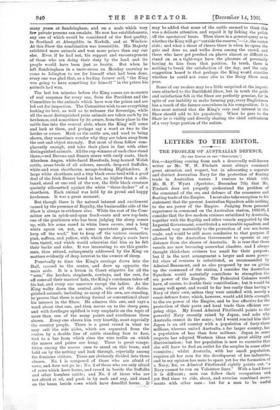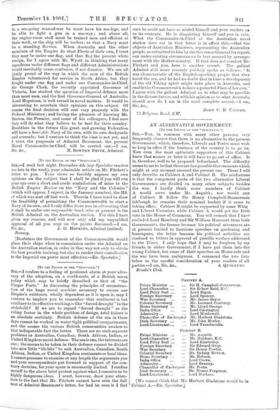LETTERS TO THE EDITOR..
THE PROBLEM OF AUSTRALIAN DEFENCE.
[To THE EDITOR OP THE "SPECTATOR.']
Sin,—Anything coming from such a deservedly well-known writer as Mr. W. H. Fitchett must always command great attention and respect, but in advocating a separate and distinct Australian Navy for the protection of floating trade in Australian waters I venture to think with Mr. H. F. Wyatt (Spectator, December 7th) that Mr. Fitchett does not properly understand the problem of the command of the sea and defence of the commerce and floating trade of the Empire. I must also take exception to his statement that the present Australian Squadron adds nothing to the sea power of the Empire. Judging from personal experience in command on the Australian station, 1892-95, I consider that the five modern cruisers subsidised by Australia, together with the flagship and other vessels supported by the Imperial Government, constituted a serviceable squadron, and conduced very materially to the protection of our sea-borne trade, and would be still more conducive to that purpose if allowed by the Australian Government to operate at any distance from the shores of Australia. It is true that those vessels are now becoming somewhat obsolete, and I always thought third-class cruisers too small for their purpose; but if in the next arrangement a larger and more power- ful class of cruisers is substituted, as recommended by Admiral Beaumont, and as also proposed by me on giving up the command of the station, I consider the Australian Squadron would materially contribute to strengthen the sea power of the Empire. The Federated Colonies would have, of course, to double their contribution; but it would be money well spent, and would be far less costly than having a Navy of their own, unless they were satisfied with merely a coast-defence force, which, however, would add little strength to the sea power of the Empire, and be less effective for the protection of their ports and local trade than efficient sea- going ships. My friend Admiral FitzGerald points to the powerful Navy recently raised by Japan, and asks why Australia cannot do the same ; but I would remind him that Japan is an old country with a population of forty-three millions, whereas united Australia, a far larger country, has a population of less than four millions.. Japan. in • some respects has adopted Western ideas with great ability and discrimination; but her population is now so excessive that she will have to find an outlet for the surplus in some other countries ; whilst Australia, with her small population, requires all her men for the development of her industries, and in my opinion has none to spare yet for the formation of a 'Navy, for, as Admiral FitzGerald rightly points out, "a Navy cannot be run on Volunteer lines." With a land force it is different; men can follow their occupations and yet find time to ride, shoot-, and exercise combined move- ments with other men : but for a man to be - useful in a sea-going man-of-war he must have his sea-legs, and be able to fight a gun in a sea-way ; and above all, the engine-room staff must be trained men and efficient at their work, or the ship will be useless; so that a Navy must be a standing Service. When Australia and the other members of the Empire do start Fleets of their own, I trust they may be under one flag, and that flag the present white ensign, for I agree with Mr. Wyatt in thinking that many squadrons under different flags and different Administrations would inevitably cause confusion, if not disaster. We are all justly proud of the way in which the men of the British Empire volunteered for service in South Africa, but they fought under one flag and under one Commander-in-Chief. Sir George Clark, the recently appointed Governor of Victoria, has studied the question of imperial defence more than most men, and the first Governor-General of Australia, Lord Hopetoun, is well versed in naval matters. It would be interesting to ascertain their opinions on this subject. Of course the final decision will rest very properly with• the Federal Ministers ; and having the pleasure of knowing Mr. Barton, the Premier, and some of his colleagues, I feel sure they will do what they believe to be best for their country. Doubtless in the future this great and growing Federation will have a bond-fide Navy of its own, with its own dockyards and arsenals; but I venture to think the time is not yet, and I trust the proposals of -Admiral Beaumont, the present Naval Commander-in-Chief, will be carried out.—I am, Sir, Sze., N. BOWDEN SMITH, Admiral.















































 Previous page
Previous page